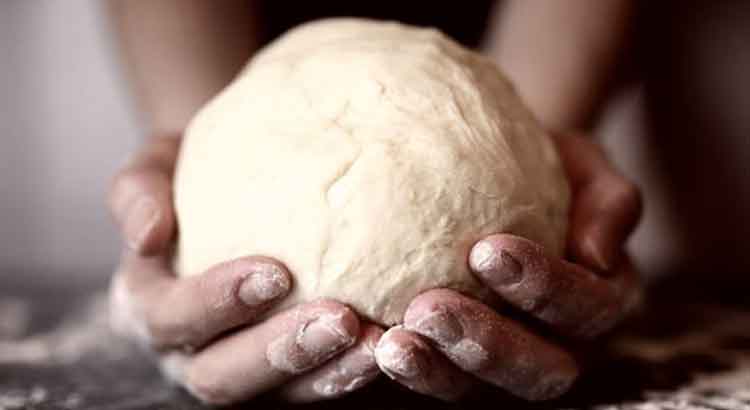Do you ever find yourself eagerly opening your oven to enjoy a delicious homemade pizza, only to be hit by an unexpected, unpleasant odor? Is your pizza stone the culprit behind this mysterious smell?
The most common reason pizza stones end up smelling is the absorption of grease and food particles during baking. Over time, these residues can turn rancid, resulting in an unwelcome aroma that lingers in your kitchen. But fear not, we have seven simple and effective ways to help you banish that smell and enjoy your homemade pizza without any olfactory interference.
From exploring the science behind the odorous issue to discovering the best cleaning methods and preventive measures, we’ve got you covered. Say goodbye to unpleasant surprises and hello to fragrant, mouthwatering pizzas. Let’s dive in and ensure your next pizza night is a truly aromatic experience.
Burn Off Odors
If you’ve ever noticed an off-putting smell when using your pizza stone, fear not; there’s a simple solution: burn off those odors. Before you start making your next pizza, place the stone in your oven and crank up the heat to its highest setting. Let it bake for about an hour. This high-temperature treatment will burn off any residual grease and food particles that have soaked into the stone.
Remember to preheat your stone gradually to avoid cracking due to thermal shock. Start with a cold oven and then increase the temperature. This method not only eliminates unwanted smells but also readies your pizza stone for the delicious task ahead.
Scrape and Brush
One of the main reasons pizza stones develop unpleasant odors is the buildup of food residue. To tackle this issue head-on, you’ll need a good scraping and brushing session. After each use, when your stone has cooled down but is still warm, take a stiff-bristle brush or a scraper and gently remove any stuck-on bits.
Avoid using soap or abrasive chemicals, as they can seep into the stone and create even more unwanted odors down the line. A simple scrape and brush routine will keep your pizza stone clean and odor-free, ensuring that every pizza you make is a delight for your taste buds and your nose.
Dry Out the Stone
After using your pizza stone, it’s crucial to dry it out thoroughly to prevent odors from taking root. Once you’ve given it a good scrape and brush, leave it in the turned-off oven to cool down completely. This helps to evaporate any remaining moisture that might be trapped within the stone.
Moisture can be a breeding ground for odors, so ensuring your pizza stone is bone-dry before storing it is essential. Remember, a dry stone is a happy stone, and it will serve you well in your pizza-making adventures.
Baking Soda Paste
Baking soda is a kitchen superhero when it comes to neutralizing odors, and it can work wonders for your pizza stone too. Create a simple paste by mixing baking soda with a small amount of water. You want a thick, spreadable consistency.
Apply the paste to the surface of your stone, paying extra attention to any areas with stubborn smells. Let it sit for a few hours or overnight. Baking soda will absorb and neutralize the odors. Afterward, rinse the stone thoroughly with water and dry it completely.
This natural and gentle method can help banish odors, leaving your pizza stone fresh and ready for your next culinary masterpiece. Plus, it’s an eco-friendly alternative to harsh chemicals, keeping your stone and your pizzas in tip-top shape.
Vinegar Solution
Vinegar is another kitchen staple that can come to the rescue when dealing with pesky pizza stone odors. To create a vinegar solution, mix equal parts of water and white vinegar in a bowl. You’ll want enough of this mixture to generously coat the surface of your stone.
Pour the solution onto the stone, making sure to cover any areas with lingering odors. Allow it to soak for a couple of hours or overnight. The acidic nature of vinegar helps break down and neutralize the smells. After soaking, rinse the stone thoroughly with water and let it air dry completely.
Remember, the vinegar scent may linger for a short while, but it will dissipate as the stone dries. This method not only removes odors but also helps maintain your pizza stone’s cleanliness, ensuring your future pizza endeavors are aroma-free.
Lemon Juice
Lemon juice isn’t just for adding a zesty kick to your dishes; it can also play a role in eliminating pizza stone odors. Start by squeezing fresh lemon juice into a bowl. Then, using a cloth or sponge, apply the juice to your stone’s surface, paying extra attention to any odor-prone areas.
Let the lemon juice sit on the stone for about 30 minutes. Lemon juice is naturally acidic, which helps cut through grease and odors. Afterward, rinse the stone thoroughly with water and dry it completely. The fresh citrus scent of lemon is a delightful bonus that replaces any lingering odors.
This method is not only effective but also adds a touch of natural freshness to your pizza stone. Say goodbye to unwanted smells and hello to the uplifting aroma of lemon in your next homemade pizza.
Season with Oil
Seasoning your pizza stone with oil is not just about preventing sticking; it can also help keep those unwanted odors at bay. Here’s how you can do it:
- Clean and Dry: Before you begin, make sure your pizza stone is clean and completely dry. Any lingering food particles or moisture can interfere with the seasoning process.
- Choose the Right Oil: Opt for a high-smoke-point oil such as vegetable oil or grapeseed oil. These oils can withstand the high temperatures of your oven without breaking down.
- Apply a Thin Coat: Using a clean cloth or paper towel, apply a very thin layer of oil to the entire surface of the stone, including the edges. Be sure not to use too much oil, as you want it to be evenly distributed.
- Bake it In: Place the oiled stone in a cold oven and then set the temperature to 400°F (200°C). Let the stone heat up with the oven and then bake for about an hour. This allows the oil to bond with the stone’s surface, creating a natural non-stick barrier.
- Cool and Repeat: After an hour, turn off the oven and let the stone cool down inside. You can repeat this process a few times to build up a good seasoning layer.
Final Thoughts
In the world of pizza-making, a well-seasoned and odor-free pizza stone can make all the difference. The simple act of enjoying a slice of your favorite pizza is an experience that engages all the senses, including the sense of smell. The last thing you want is for unwanted odors to detract from the delicious aroma of your freshly baked pie. With the techniques we’ve discussed, you can keep your pizza stone in top condition, ensuring that your homemade pizzas are as flavorful as they are fragrant.
Remember that regular maintenance is key to preventing odors from taking hold. Whether it’s burning off residue, using natural remedies like baking soda and lemon juice, or applying a thin layer of oil for seasoning, these methods can keep your pizza stone clean and fresh-smelling. Each approach has its unique benefits, so feel free to experiment and find the one that works best for you.
In the end, your pizza stone should be a trusty companion on your culinary journey, not a source of unwanted scents. By following these simple tips, you can ensure that every pizza you make is a delight for your senses, from the tantalizing aroma that fills your kitchen to the mouthwatering taste that keeps you coming back for more. Happy pizza-making!
FAQ
Q: Can I use soap to clean my pizza stone?
A: It’s best to avoid using soap on your pizza stone. Soap can be absorbed into the porous surface of the stone and may leave behind unwanted residues and flavors in your pizzas. Stick to dry brushing or using natural remedies like baking soda or vinegar to clean your stone effectively.
Q: How often should I clean my pizza stone?
A: Cleaning your pizza stone after every use is a good practice. However, if you notice strong odors or excessive residue buildup, it’s a sign that your stone needs more attention. Regular maintenance can help prevent odors from becoming a persistent issue.
Q: My pizza stone has developed some discoloration. Is this normal?
A: Yes, discoloration on a pizza stone is normal and can even add character to it. Over time, the stone may darken or develop patches due to the absorption of oils and other cooking residues. As long as your stone is clean and odor-free, a little discoloration won’t affect its performance.
Q: Can I use my pizza stone for things other than pizza?
A: Absolutely! While pizza stones are ideal for baking pizzas, they are versatile kitchen tools. You can use them for baking bread, cookies, or even reheating leftovers like reheated pizza slices. Just be mindful of any lingering odors if you use your stone for non-pizza purposes.
Q: My pizza stone cracked. Can I still use it?
A: Unfortunately, a cracked pizza stone is not safe to use. The cracks can compromise its structural integrity, and it may shatter during use, potentially causing injury or damage to your oven. It’s best to replace a cracked stone with a new one to ensure safe and enjoyable pizza-making.
Q: Can I season my pizza stone with flavored oils like garlic or rosemary-infused oil?
A: While it may sound tempting, it’s best to stick to neutral, high-smoke-point oils like vegetable or grapeseed oil for seasoning. Flavored oils can leave behind strong tastes that may interfere with the flavors of your pizzas.
Q: How can I prevent my pizza stone from getting too oily and smelly?
A: To prevent excessive oil buildup and odors, use a light hand when applying oil for seasoning. You want a thin, even layer. Additionally, avoid using too much oil when placing dough or other foods on the stone. Proper cleaning and maintenance after each use will also help keep odors at bay.
Q: Can I use my pizza stone on a grill?
A: Yes, many pizza stones are designed for use on grills as well as in ovens. However, be sure to follow the manufacturer’s instructions and gradually heat the stone to prevent cracking. Grilling pizza can add a unique smoky flavor to your pies.
Q: My pizza stone has absorbed strong flavors from a previous meal. How can I get rid of these flavors?
A: To remove strong flavors absorbed by your pizza stone, you can try the baking soda or vinegar paste methods mentioned earlier in this article. These natural remedies can help neutralize and eliminate lingering flavors.
Q: How long does it take to season a pizza stone?
A: Seasoning a pizza stone typically takes about an hour in a preheated oven at 400°F (200°C). You can repeat the process a few times to build up a good seasoning layer for optimal performance.
Q: Can I use a pizza stone with a pizza peel or should I place the pizza directly on the stone?
A: Using a pizza peel is a common practice and can make transferring your pizza onto the stone easier. It also prevents the dough from sticking to the stone’s surface, ensuring a smooth release. However, you can also place the pizza directly on the stone if you prefer.
Q: What should I do if my pizza stone has a stubborn stain or odor that won’t go away?
A: If you’ve tried various cleaning methods, and the stain or odor persists, it might be time to retire your current pizza stone and invest in a new one. Some odors and stains can become deeply ingrained in the stone and may be challenging to remove completely.

